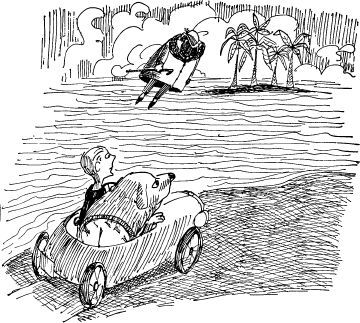Newspapers made money through classifieds, stock listings and real estate listings. Advertising was big, because newspapers were the only easy-to-read, widely-consumed, mass communication in the pre-web age, other than TV. But it wasn’t just advertising. Newspapers were really a collection of products being distributed between articles. Classifieds, real estate listings, announcements, police blotters, brand awareness, etc… Because they owned their communities and because they were zebras without tigers, they could glide along without innovation and with sub-standard products.
Then came the web and it was a tiger that took nibbles off the zebra. With the internet’s global reach it suddenly became immensely profitable to do ONE thing REALLY well. So newspapers lost their coupon business because Groupon just did that ONE thing and did it really well. They lost classifieds because Craig’s List did that ONE thing and did it really well.
Newspaper companies looked at their shrinking portfolio of products and made the mistake of deciding that their business was producing journalism. Ads would support them, because where else would people advertise? Then web advertising became easy. Then SEO made it so people would search for a how, and companies could provide the answer without the middle man.
Suddenly, the market crashed and companies that had just kept buying newspaper ads had to look at their budgets and ask themselves… is this really worth it? They saw newspaper ads, which were flat, boring, and provided no metrics, and they saw web ads and declared: print advertising is useless!
And lo, the newspapers saw their advertising dry up. Local papers discovered that when a tight-budgeted owner had to choose between a coupon ad and being able to delete negative Yelp comments, they chose Yelp comments.
Then the newspaper business said: but we Do Good and we Make Journalism and surely people will pay for that. But no, the people did not pay for that. It turned out that the people probably NEVER paid for that. No they paid to get news (because it was the only way to get it with them on their train rides and lunch breaks) and they paid to get their stocks (because they didn’t have Yahoo Finance) and they paid to see how much the houses around them were worth, because that was how much they were worth (but there’s a real estate website for that now). Yes, those subscribers did pay for coupons, and finding people to wash their cars for $5 and anonymous sex, but the internet did all that better now.
Indeed, there were ‘national’ newspapers, that made large sums, but WSJ built their business of printing a ton of ticker prices first, and WaPo was really a local paper that everyone in DC paid for because everyone in DC has a higher level of self-interest than the average Donald Trump, and NYT made their money because New Yorkers obsess over real-estate like they’re addicted to sweet sweet cocaine. Yet, even the national papers suffer because they don’t do that one thing really well, other companies do.
So we must ask the question: Is journalism an actual business, one that makes money? Did we ever pay for articles? Who is the customer of the print newspaper? Is it really the readers or is it the advertisers? If it was for the advertisers, and the real estate agents, and the classifieds listers, then what’s left when they leave? Pretty much nothing, and a nice fantasy about the Good We Do.
Inspired by: The newspaper crisis: by the numbers


